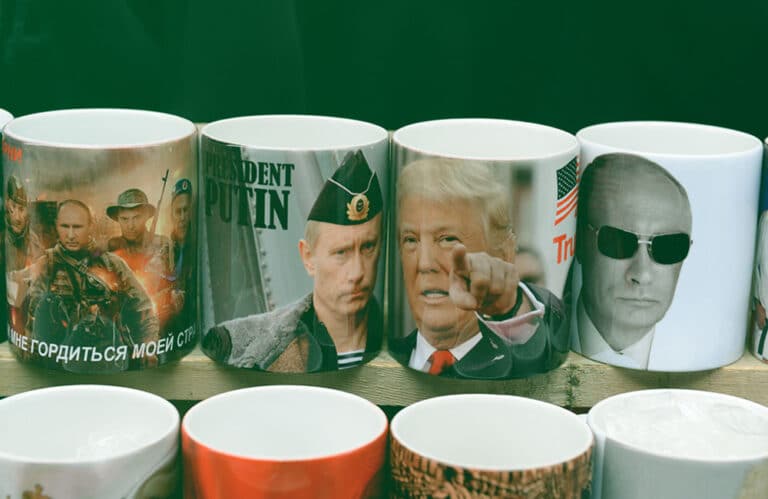
-
The fascist Trump regime is ideologically more aligned with Russia and China than traditional Western democracies.
-
The big global struggle is no longer between democracy and communism. It is now between a conservative fascist ideology against a liberal ideology that wants global cooperation.
-
Western European countries will need to boost their military spending to defend their security and limit the encroachment from Russia. Liberal democracies are under threat from both Russian and US fascist governments.
-
Western European countries, Asia and Australia will turn more towards China for economic cooperation and seek to pry it away from Russia as Russia becomes closer to the USA. China may be willing to improve relations with these regions to increase its strategic position against the USA.
-
The barriers holding back China from engulfing Taiwan are fading fast. It may see little resistance from the USA or its traditional Western alliance.
-
Over the next few years, Trump will be heavily focused on the battle with enemies within. Meanwhile, US alliances with traditional Western democracies will fade along with its global influence.
-
The USA-first policy will force other countries to step up their own game in military defence and economic success. Traditional allies and strategic rivals alike must step up their support for their economies and forge new alliances away from the USA. This is likely to favour China in the near term, and over the long term, the USA’s economic power is likely to diminish.
-
Investors should consider allocating away from highly valued US assets towards China. Assets that benefit from global cooperation and liberalism may continue to struggle. DEI and climate-friendly investment may struggle. Companies that earn more from military spending should do well.
Some may wonder if Trump’s disdain towards Western Europe and little regard for Western democracies is born out of a USA-first policy. Following recent events in Europe, some may wonder if Trump has a deliberate aim to support Russia and break apart Western Europe.
To what end does this serve the US interests in the world?
The ideology of the Trump administration is essentially fascist in that they want to support only the USA with little regard for anyone outside of its borders. And it wants to have permanent authoritarian control over the government to install a Christian doctrine.
Russia is more closely aligned to this philosophy than Western European democracies. It makes sense that the USA allies with Russia to give it more power to make Western Europe bend to its will.
Russia has elections controlled by Putin. It is arguably a fascist regime. China and Russia have elements of communism, with the government playing a significant role in directing investment and activity across the broader economy. However, communism doesn’t really exist; both countries are largely capitalist-style market-driven economies.
In the past, the US and other Western democracies aligned against Russia and China in what they saw as a battle between democracy and communism. That battle is not where the USA or the world is now.
Both democracy and communism have largely failed to deliver on their promise. Both are flawed. They attempt to be moral, one offering the hope of freedom to choose, the other offering the hope of sharing the wealth and burden of life. Both are vulnerable to being overrun by those seeking power for the sake of enriching themselves and installing their vision, in doing so, reducing the freedom of those who do not conform.
There are very few functioning democracies. Many countries have elections, but the ruling power often controls them. Even the good ones really fail to deliver, as the winning side mainly sets policy to win the next election rather than the long-term prosperity of the people.
There is no reason for Trump’s vision of the USA to support the traditional Western democracies over the traditional communist countries. These old battle lines mean nothing to him. Western Europe is just another adversary or transactional opportunity. What’s in it for us? It’s on par with Russia and China.
Also read: Global Asset Allocation: The View From Australia
Will Trump care if China takes over Taiwan? Trump may worry if China gains the technological prowess of Taiwan in its semiconductor manufacturing. But it would cost a lot for the USA to help defend Taiwan, so the USA would ask, what’s in it for me? There is not much Taiwan can offer. China could offer more to the USA and would be willing to provide the USA with what it thinks it wants to keep Trump out of Taiwan. It should not be surprising if China takes Taiwan in the next few years.
China’s government style, control over media, and conservative social views are actually more closely aligned with Trump’s fascist style than traditional democracies. Arguably, China, Russia and the USA under the Trump administration are more closely aligned than the USA is to its traditional allies.
Those three countries are not really about working together. They are more about preserving their own power, with some imperialist ambitions. But they can probably support each other in maintaining their fiefdoms and sharing the spoils of the rest of the world.
What would Trump like from Western Europe now? He would like friendly governments with little economic consequence other than providing markets for US companies. Friendly governments would probably include those that have conservative fascist-type governments. That is perhaps why his key followers (Trump and Vance) have weighed heavily into European politics.
Trump would not want Russia to take over all of Europe, but he would prefer not to have to come to its rescue, so he wants Europe to essentially build up its military so he doesn’t have to.
Putin probably doesn’t strongly desire to take over all of Europe, but he would like for it to not threaten his power with its liberal democracies, enticing his people to want the same. If fascists ran Western Europe, it would be better for his control. He might like parts of Europe, especially if they had mineral resources, and he wants friendly puppet governments on his borders.
Trump and Putin are more likely to work together to seek these goals. They are more likely to carve out the spoils of Ukraine, Greenland and other territories and seek for Western Europe to remain a moderate power base and one that subserviates to the doctrine of their forms of fascist ideologies.
Arguably, Putin is more adroit than Trump and experienced in these matters. He also already fully controls his government and is thus less distracted than Trump by domestic politics, so he may out-negotiate Trump to extend his power and vision for Russia at the expense of the USA and Western Europe.
Trump will see the need to consolidate his own power at home and deal with the enemy within as a more urgent objective than dealing with matters in Europe or China. Providing both those countries space to seek their own goals.
We are amid a significant realignment of the global struggle. One between fascist ideology driven by conservative values against a liberal ideology that wants global cooperation (for such things as dealing with climate change that requires collective action).
The USA has been a key player in this struggle and has tipped the balance of power to the side of fascism.
The battle is increasingly within borders rather than between countries. Fascism has little use for alliances and focuses more on the struggle within. Those seeking liberal societies that cooperate across borders are in the descendency. They are largely beaten down in Russia and China. But they should not be counted out in the traditional Western democracies.
It is not fair to say that China does not want to address the global challenge of climate change. There are grey areas, of course. But it’s of little or no concern to the Trump or Putin’s regimes.
Trump and his followers are going to work very hard to consolidate their power in the USA over the next four years. They are off to a great start with installing followers into key leadership positions, including across formerly non-partisan government agencies.
If he had lost the last election, Trump would not have accepted defeat, and his team will do all it can to install him or an acolyte in power at the next election and further move to marginalise the opposition.
Over the long term, even if he does succeed, liberal ideals will never die. People will seek freedom, and the struggle will always continue. The balance will swing back and forth between liberalism and conservatism. Social cohesion is essential for survival, and people must find a way to balance their desire to do whatever they like and work together. Religion exists to create social order. It hasn’t been adaptable enough to satisfy the natural desire for personal freedom.
Perhaps we will see Western Europe seek stronger relations with China and try to pry it away from Russia now that Russia and the USA are getting closer. More than the USA and Russia, China may have the foresight to address climate change and thus be more willing to seek global alliances. The rest of Asia is already closer to China and seeks economic cooperation for its benefit.
Australia has traditionally been closely aligned with the US and Western Europe but is also friendly to China and Asia for economic success.
There are conservatives in Australia who seek power using the Trump playbook. However, even they may rethink their approach after Trump’s abandonment of its traditional alliance with Western Europe. Australian leaders need to rethink their close alliance with the USA.
Which brings into question the AUKUS agreement. Does Australia want to be so heavily reliant on the USA for its military? It will still want to keep the USA on its side, but it should no longer trust the USA not to interfere in its government or not use it as a pawn in its ambitions. An America First fascist government is only going to want a compliant Australia, or at least have it on its side to help balance China’s power.
Australia will need to play nice with both China and the USA, and at the moment, that means distancing itself from its currently strong alliance with the USA, and getting more friendly with China.
The USA will soon feel less powerful and lonely without Western Europe and Australia. I doubt it will really trust its new friends in Russia. Subtly, Australia and Western Europe will influence Trump by getting closer to China. China will like that, making it seem they have more friendly relations and economic cooperation with former US allies, helping it battle the USA for strategic economic and political power.
Currently, the US has strong global economic power, and it seeks to use and protect it. Its country’s assets are very highly valued. However, its USA-first policy will force other countries to step up their own game in military defence and economic success. Traditional allies and strategic rivals alike have to step up their support for their economies and forge new alliances away from the USA. This is likely to favour China in the near term, and over the long term, the USA’s economic power is more likely to diminish.
Investors should consider allocating away from highly valued US assets towards China and Russia. Assets that benefit from global cooperation and liberalism may continue to struggle. DEI and climate-friendly investment may struggle. Companies that earn more from military spending should do well.
This article first appeared on LinkedIn.

































